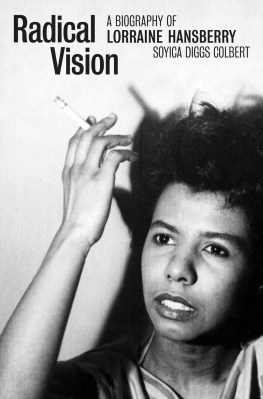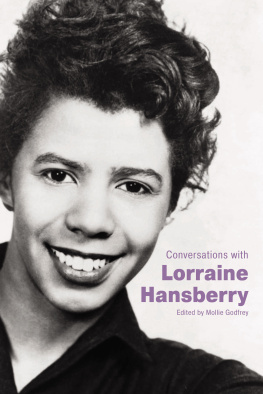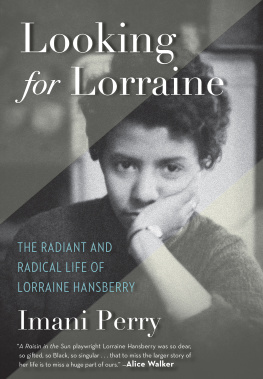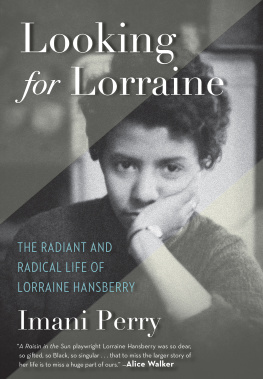Soyica Diggs Colbert - Radical Vision: A Biography of Lorraine Hansberry
Here you can read online Soyica Diggs Colbert - Radical Vision: A Biography of Lorraine Hansberry full text of the book (entire story) in english for free. Download pdf and epub, get meaning, cover and reviews about this ebook. year: 2021, publisher: Yale University Press, genre: Politics. Description of the work, (preface) as well as reviews are available. Best literature library LitArk.com created for fans of good reading and offers a wide selection of genres:
Romance novel
Science fiction
Adventure
Detective
Science
History
Home and family
Prose
Art
Politics
Computer
Non-fiction
Religion
Business
Children
Humor
Choose a favorite category and find really read worthwhile books. Enjoy immersion in the world of imagination, feel the emotions of the characters or learn something new for yourself, make an fascinating discovery.
- Book:Radical Vision: A Biography of Lorraine Hansberry
- Author:
- Publisher:Yale University Press
- Genre:
- Year:2021
- Rating:4 / 5
- Favourites:Add to favourites
- Your mark:
- 80
- 1
- 2
- 3
- 4
- 5
Radical Vision: A Biography of Lorraine Hansberry: summary, description and annotation
We offer to read an annotation, description, summary or preface (depends on what the author of the book "Radical Vision: A Biography of Lorraine Hansberry" wrote himself). If you haven't found the necessary information about the book — write in the comments, we will try to find it.
Radical Vision: A Biography of Lorraine Hansberry — read online for free the complete book (whole text) full work
Below is the text of the book, divided by pages. System saving the place of the last page read, allows you to conveniently read the book "Radical Vision: A Biography of Lorraine Hansberry" online for free, without having to search again every time where you left off. Put a bookmark, and you can go to the page where you finished reading at any time.
Font size:
Interval:
Bookmark:
Radical Vision

Published with assistance from the foundation established in memory of Philip Hamilton McMillan of the Class of 1894, Yale College.
Copyright 2021 by Soyica Diggs Colbert.
All rights reserved.
This book may not be reproduced, in whole or in part, including illustrations, in any form (beyond that copying permitted by Sections 107 and 108 of the U.S. Copyright Law and except by reviewers for the public press), without written permission from the publishers.
Yale University Press books may be purchased in quantity for educational, business, or promotional use. For information, please e-mail (U.S. office) or sales@yaleup.co.uk (U.K. office).
Set in Adobe Garamond type by IDS Infotech Ltd. Chandigarh, India.
Printed in the United States of America.
ISBN 978-0-300-24570 7 (alk. paper)
Library of Congress Control Number: 2020943772
A catalogue record for this book is available from the British Library.
This paper meets the requirements of ANSI/NISO Z39.48-1992 (Permanence of Paper).
10 9 8 7 6 5 4 3 2 1
To Rodger
Contents
Acknowledgments
I would like to thank the National Endowment for the Humanities and the Schomburg Center Scholars in Residence Program for their support. I would also like to thank Farah Jasmine Griffin, director of the Scholars-in-Residence Program, and the 20152016 participants, Sylvia Chan-Malik, Kaiama Glover, Tsitsi Jaji, C. Riley Snorton, Sonia Sanchez, Caree Banton, Nicole Wright, Jeff Diamant, and Adrianna Campbell, for their feedback on early drafts of this work. I also thank then Schomburg Center associate curator Steven G. Fullwood for his support of and insight on this project. The book would not have been possible without the Lorraine Hansberry Literary Trust, the Jewell Handy Gresham-Nemiroff Trust, and their co-trustee Joi Gresham. Thank you for giving me access to and permission to use the archive, for preserving and stewarding the dissemination of Hansberrys work, and for supporting and championing this project. The trusts serve an essential purpose in upholding Hansberrys legacy and impact and making her work accessible for generations to come. Thank you also to Georgetown University, Christopher Celenza, dean of the College of Arts and Sciences at Georgetown University, the support of the Georgetown University Idol Family Professorship endowment fund, and the Georgetown University Healey Family Endowed Fund for Academic Excellence for their financial support, which enabled research assistance and to obtain image permissions. Sarah Miller at Yale University Press supported this project from its inception and provided exacting feedback throughout its development. I am grateful for her careful stewardship of the volume. Thanks to Phillip King at Yale University Press for the care you showed the manuscript through helpful suggestions and for your oversight during the production process. The generosity of colleagues extends well beyond institutional affiliations, and I am grateful to many friends that have read, discussed, and offered feedback on this project.
I presented portions of this book at Boston College, Northwestern University, Cornell University, Mary Washington University, Brown University, Rutgers University, Yale University, University of Maryland College Park, the Black Thought Collective, and the Futures of American Studies Institute at Dartmouth College; I am grateful for the thought-provoking feedback I received at these events. I also appreciate the feedback I received from generous colleagues on drafts of the manuscript: Margo Crawford, LaMonda Horton-Stallings, Douglas Jones, Paige McGinley, Robert J. Patterson, Samantha Pinto, Kevin Quashie, Shane Vogel, and Isaiah Wooden. Thank you to Derek Goldman for sending me an interview with Hansberry that proved quite useful and to Maurice Jackson for sharing materials from his personal archive. I also want to thank the community of scholars and friends that have cheered on, offered advice, and made suggestions for this work: Jennifer DeVere Brody, Joshua Chambers-Letson, Erica Edwards, Rgine Jean-Charles, Michelle Wallace, Delicia Lewis-Webb, Heather Graham, Candice McFarlane, Kelly Baker Josephs, Drew Lichtenberg, Imani Perry, Evie Shockley, Salamishah Tillet, and Dagmawi Woubshet. The generosity of community extends well beyond this list, and I am grateful to many friends that have discussed and offered feedback on this project.
I have learned so much from my brilliant students and especially from those in my spring 2019 James Baldwin, Lorraine Hansberry, and Nina Simone Seminar. This book would not exist if Maurice Wallace had not encouraged me to write it. It would also not be complete without the indefatigable research assistance of Fatima Dyfan, Skylar Luke, MacKenzie River Foy and Taurjahi Purdie. I am also grateful to Brent Hayes Edwards, Jarvis McInnis, Tracy Heather Strain, and Randall MacLowry for their aid in helping to locate permissions and documents. Finally, I must thank my family. Ive learned over the years that writing a book has a deep impact on all of those closest to you. For your enduring support, thank you to the Brown Family, R. Harrington Diggs, Joanne Diggs, Diallyo Diggs, Rakiya Moore, and Diallyo Diggs II. And to Rodger Colbert, you gather me and make me better. Thank you!
Radical Vision
Introduction: Notes of a Native Daughter
Daddy died,
Raisin opened
and yesterday I got a divorce
all on March 10. 1945; 1959; 1964.
Lorraine Hansberry learned by telegram that her father died. On the same day thirteen years later, her career-defining play, A Raisin in the Sun, opened on Broadway. The play catapulted her from obscurity to household name. Just five years later, on another March 10th, she divorced the greatest friend of her mindRobert Nemiroff, or as she affectionately called him, Bobby.
The shadows that loomed throughout Hansberrys life cast large impressions. She lived in the shadow of her fathers death; death crystallized his impact on her life. She lived with illness, wondering when she would die. She lived with the social pressure of being the face of Black theater and a Black radical. She lived with the weight of her marriage ending and the social stigma of divorce in the 1960s. Each March 10th established a loss (her father, her anonymity, her marriage) that would serve as an essential moment to her becoming free. Although not all equal in their impact on her development, they each mark key turning points in her life and work.
Lorraines father, Carl Augustus Hansberry, represented an American type of social and political striving. Born on April 30, 1895, from Gloster, Mississippi, as a young man he migrated to the north after graduating from Alcorn Agricultural and Mechanical College. In Chicago, he began his business and political career. He met and married Nannie Louis Perry, who was from Columbia, Tennessee. She was also a college graduate, having earned her degree from Tennessee State University. Together they had four children: Carl Augustus, Perry Holloway, Mamie Louise, and Lorraine Vivian.
A well-educated middle-class couple, they lived on the South Side of Chicago. Known in the Windy City as the kitchenette king, Carl built his real estate empire, drawing from the Black adage to make a dollar out of fifteen cents. He bought single-unit properties on the South Side and chopped them up into residences for two or three families. He produced single-family dwellings that had their own kitchen but shared a bathroom, and were known as kitchenettes. These tiny units provided housing to the masses of Black migrants relocating from the south to segregated Chicago and helped establish Carls financial empire. According to Mamie, He made quite a fortune during the depression because the white landlord simply couldnt collect the rent, and he could. Things just grew from there. Most people were going broke. He was making quite a lot of money and set up our business. We had a maintenance crew and housekeepers, and his half-sister came as a secretary and my mothers niece was a secretary and his half-brother were collector. Hed have to go collect from all the buildings from the housekeepers, and the housekeepers would collect the rest ... [from the tenants]. That grew and grew and things got better and better. The real estate business supported Carls political aspirations and helped provide a comfortable life for his family. While he acquired properties, Nannie taught school and served as a ward leader for the Republican Party. Together they formed a power couple that equally invested in reserved respectability and racial uplift. Mamie described them as stately.
Next pageFont size:
Interval:
Bookmark:
Similar books «Radical Vision: A Biography of Lorraine Hansberry»
Look at similar books to Radical Vision: A Biography of Lorraine Hansberry. We have selected literature similar in name and meaning in the hope of providing readers with more options to find new, interesting, not yet read works.
Discussion, reviews of the book Radical Vision: A Biography of Lorraine Hansberry and just readers' own opinions. Leave your comments, write what you think about the work, its meaning or the main characters. Specify what exactly you liked and what you didn't like, and why you think so.










